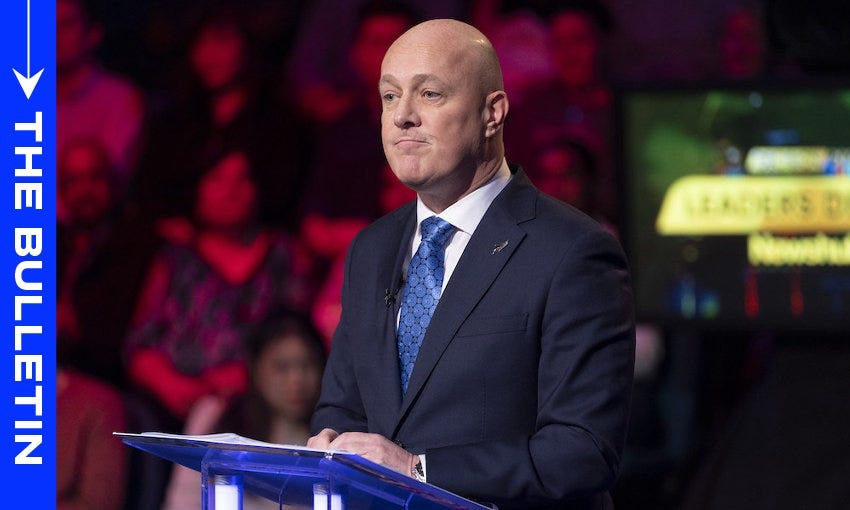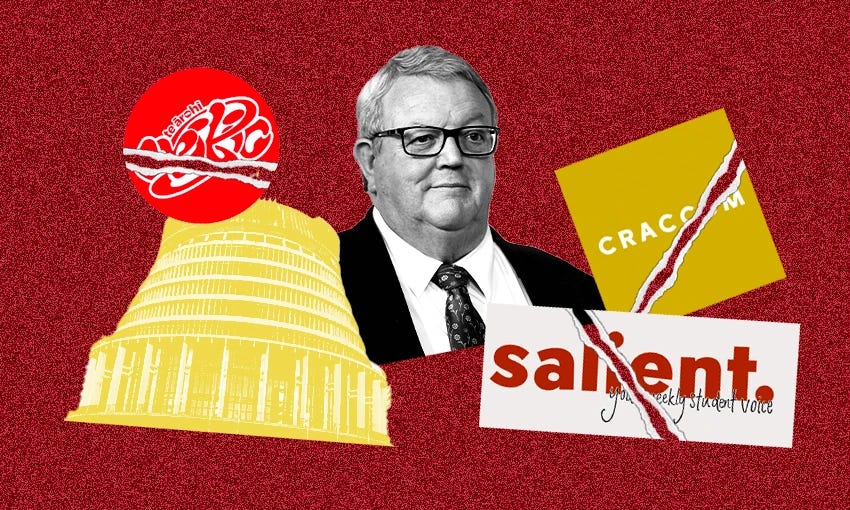Political entitlements in an austere era
The PM reversed on his accommodation allowance, calling it a distraction. But with one of his ministers citing 'austerity' and school lunches under review, it's become a lesson in political judgment
Mōrena, and welcome to The Bulletin for Monday, March 4, written by Anna Rawhiti-Connell.
In today’s edition: amalgamation proposal under discussion for Wellington councils; dental care costs rising; minister warned of possible bailout requests for media in November; but first, a lack of political judgment, the state of Premier House and the use of a taboo “A” word
Premier House not uninhabitable but costly to repair and restore
Newsroom’s Marc Daalder broke the story on Friday morning that prime minister Christopher Luxon was the first prime minister in at least 34 years to claim a $52,000 top-up to his $471,000 salary to cover his accommodation expenses. Luxon cited the state of Premier House, where prime ministers have previously lived, as the reason he needed to live in his own apartment. Over the weekend, reports have emerged about the $30m price tag required to repair and restore Premier House. The report does not state that the residence is unable to be lived in.
Not every issue can be blown past
By the time Friday afternoon rolled around, Luxon had backtracked on being entitled to the entitlement in the face of questioning and outcry, saying, “It's clear that the issue of my accommodation allowance is becoming a distraction”. He will not claim the allowance and pay back the $13,000 he’s already received. This morning, Newsroom’s Tim Murphy says the furore will pass but represents “the limitations of a political and communications strategy that assumes every controversy can be extinguished or ridden through by challenging its right to exist, declining to engage, and starving it of the oxygen of a reaction.”
Austerity politics
The term “distraction” is often used within politics to talk about things like ministerial scandals that occupy the news cycle, often at the expense of what the government would like to be talking about or big state of the nation issues. For many, Luxon’s allowance issue specifically rankles because he owns seven homes, and the apartment at the centre of the questions about the allowance is owned mortgage-free. That would probably get up people’s noses at the best of economic times, but the “entitled to the entitlement” lines were delivered against a backdrop of increasing warnings about how bad the books are and demand for cost-cutting from the public service. Conservation minister Tama Potaka used the word “austerity” four times in an interview with the AM Show’s Lloyd Burr last Thursday. Burr’s reaction is underpinned by what both The Post’s Andrea Vance and Vernon Small have suggested is a taboo around the use of that word by parties on the right. Burr raised a question about returning to a time of zero budgets, last seen here in the early 2010s. “Austerity” is now most closely associated with an era of Conservative party rule in the United Kingdom.
School lunch programme is under review, coffee cut
This morning, The Post’s Anna Whyte reports on progress from within the public service on the government’s request that it make cost reductions to find 6.5% in savings. As Whyte reports, at the Ministry of Social Development, they’ve cut off the plunger coffee supply to save $70k a year. Instant remains available. Staffing cuts at Oranga Tamariki haven’t been ruled out and staff were told on Friday that further changes would need to made to meet the goal. Associate Education Minister David Seymour has confirmed the government-funded school lunch programme is under review ahead of the Budget. As reported by Alex Spence in the Herald this morning, representatives of the Health Coalition Aotearoa (HCA) have written to Seymour to request a meeting urgently. The HCA is alarmed that Seymour, who campaigned against the programme during the election campaign, has responsibility for it.
Dental care costs rising with significant variance between regions
A new survey released by the New Zealand Dental Association shows dental care costs have risen by nearly 25% in three years and that there is significant variance in costs between regions. The average price of an examination North of Auckland was $75. In Wellington it was $91 and in Otago/Southland, $125. The Ministry of Health national health survey for 2022/2023 found nearly half of adults (44.%) experienced unmet need for dental care due to cost in the past 12 months. Labour campaigned on free dental care for under 30s by 2026, but the NZDA raised questions about the costings put forward during the election campaign.
Amalgamation proposal under discussion for Wellington
As Stuff’s Glenn McConnell reports, sources across central and local government say there is “no question Wellington’s councils will eventually merge”. McConnell reports that Wellington’s mayors have scheduled ongoing meetings to consider the prospect and that Carterton mayor Ron Mark said “draft proposals” had already been circulated, and mayors talked about it on Friday. Chris Bishop says, “People are ready for a fresh look at this,” but the councils need to come to the government with a consensus. Wellington mayor Tory Whanau says she is open to the proposal, and Hutt City mayor Campbell Barry says all options should be on the table.
Financial support from our audience is essential to ensuring our work continues
Whether it’s a shocking and consquential announcement or rats are taking over our supermarkets, we know our community comes to The Spinoff to make sense of the world in the best and worst of times. We're committed to telling stories about Aotearoa, for Aotearoa, with rigour, range and humour. If that’s something you value, we’d love for you to consider becoming a Spinoff member or donating. If you're reading this and are already support us, a huge thank you from all of us.
Mad Chapman, Editor
Click and Collect
Broadcasting minister Melissa Lee warned by officials in November that government may face requests to bailout media companies.
Minister for mental health, Matt Doocey, tells Q&A’s Jack Tame that he believes high suicide rates among Māori are linked to poverty, discrimination, stigma and colonisation.
RNZ’s Kate Newton digs into the similarities between language used by the tobacco industry and in documents sent from the office of associate health minister Casey Costello.
A cop, a defence lawyer, a mayor and a gang member… the joke, as they say, writes itself. Good read from Stuff’s Marty Sharp, who has spoken to all four in the Hawke’s Bay in the wake of the government’s proposed gang patch ban.
97% of kids surveyed as part of the Growing Up in New Zealand study participate in some form of extracurricular activity, including sport, dance, drama and community clubs and groups.
Feeling clever? Click here to play 1Q, Aotearoa’s newest, shortest daily quiz.
Stewart Sowman-Lund reports on a decision by Gerry Brownlee to revoke access to the press gallery for student journalists. Eda Tang speaks to those fighting to change a law that requires embryos and egg and sperm cells to be destroyed after 10 years. Allison Hess investigates who or what is killing North Island robins in Wellington. In this week’s Sunday Essay, Kristin Kelly reflects on being close to the Loafers Lodge tragedy and yet a whole universe away. Matty McLean tells us about the time Paul Henry made him break the law. Gabi Lardies reviews Camp A Low Hum 2024. We have a handy guide to where you can watch all the Oscar nominated films.
Sporting snippets
Hamish Kerr took a gold in the high jump at the World Athletics Indoor Championships in Glasgow, while Eliza McCartney wins silver.
Australia wins first test against the Black Caps at the Basin Reserve.
Got some feedback about The Bulletin, or anything in the news? Get in touch with me at thebulletin@thespinoff.co.nz.
If you liked what you read today, share The Bulletin with friends, family and colleagues.














I doubt that Premier House is in a worse state of repair than the average Wellington rental accommodation.
The taboo around the use of the word 'Austerity' by the Right is because, as a term with specific meaning in political economy, if you search it, you will very soon come across academic papers, books by academics aimed at a general readership, Youtube presentations etc. that demonstrate that Austerity is a mechanism for reinforcing 'traditional capitalist class relations' (i.e. worker subservience) despite that it damages the economy in the process (a 'price worth paying').
Worth a search:
Marianna Mazzucato
Clara E Matteo
One can imagine that this subject is of specific interest to academics of Italian ancestry, since Italy is where this program was bought to refinement in the 1920's/30's